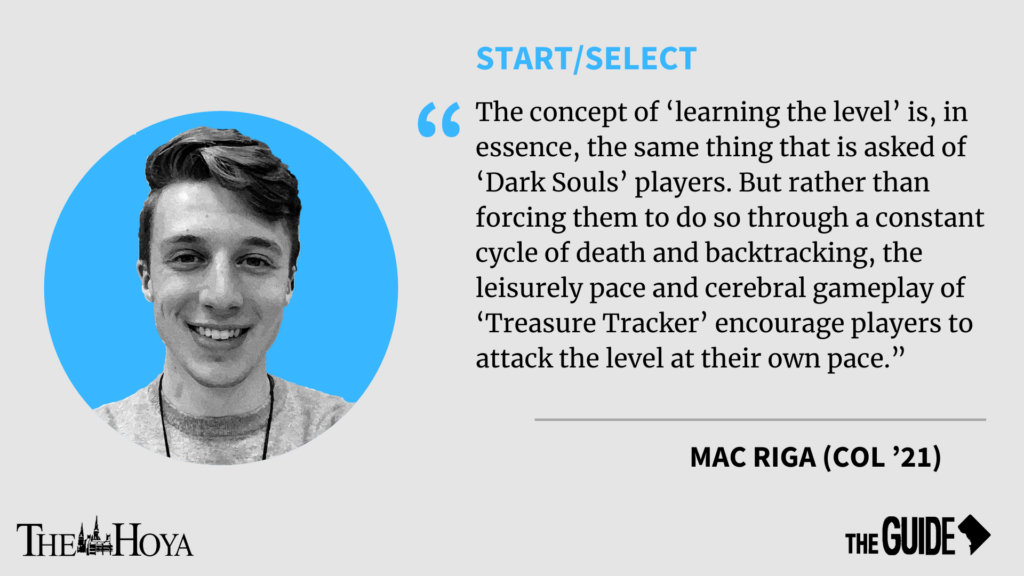2014’s “Captain Toad: Treasure Tracker” is 2011’s “Dark Souls,” but better.
Before you storm off, let me explain. Since “Demon’s Souls,” developer FromSoftware’s punishingly difficult, gothic dark-fantasy, role-playing games, the “Dark Souls” series, have created a whole new genre of games and single-handedly defined the past decade of gaming. Gamers are drawn to its grimly beautiful aesthetics, complex lore told through item descriptions and scenery, and hard-as-nails gameplay.
This last piece is the most interesting to me: people delight in the masochistically challenging gameplay of “Dark Souls.” The player is thrust into an unknown and hostile environment, teeming with traps and deadly monsters, with little more than a few short text boxes to serve as guides. Players struggle their way through a quick opening area, face down a terrifying boss and begin working their way through the labyrinthine environments of the fictional Lordran, Yharnam or, uh, Japan. No matter where the player is dropped, the core skill tested remains the same: the player’s ability to remember and learn the level through a trial and error loop.
I personally never took to the series. I find the loop structure to be frustrating and kind of boring, though others would argue I lack patience or just need to “Git Gud”. Whatever the case may be, every attempt I’ve made to sink my teeth into the series has been short-lived. Nevertheless, I couldn’t help but feel there was a “Souls-”shaped hole in my heart. Until I met the good “Captain Toad”.
Released initially for the Wii U in 2014 — though I’ll be discussing the 2018 Switch port — “Captain Toad: Treasure Tracker” is a stand-alone puzzle game based on the weird, genre-shifting “Toad” levels from 2013’s “Super Mario 3D World.” Since these features in “Super Mario 3D World” were underwhelming levels in an underwhelming game, “Treasure Tracker” seemed destined to fail. What emerged, however, was a charming and surprisingly rich little game.
The game consists of a severely restricted Toad. Weighed down by his treasure-filled bag, Toad can’t jump, moves slowly and falls like a brick as he works his way through self-contained puzzle boxes. While “puzzle boxes” might sound like a weird, advertising-buzzword-type way to describe them, there’s no better way to do so. The small, cube-shaped levels look like tiny models or shadow boxes, with tightly interlocking corridors and mechanisms.
The game is played by rotating the camera around the level to glean new information and to allow Toad to access further areas, similar to 2007’s “Super Mario Galaxy.” The way the levels’ moving pieces fit together is nothing short of masterful; like the best dungeons from 3D Zelda games, they reward a firm spatial awareness and provide puzzles that urge the player to take a step back and consider the level as a whole interconnected unit.
The concept of “learning the level” is, in essence, the same thing that is asked of “Dark Souls” players. But rather than forcing them to do so through a constant cycle of death and backtracking, the leisurely pace and cerebral gameplay of “Treasure Tracker” encourages players to attack the level at their own pace. Players slowly untie the knot of the level until the last breakthrough where the stage unfolds before them — it’s the same rush and feeling of mastery achieved when clearing a section of “Dark Souls,” minus the demonic tone and controller-throwing rage.
That is not to say the game is devoid of the same reflex-based challenge. While the main story is fairly easy, the optional challenges and time trials can provide real difficulty, which engage a player’s motor skills as well as their mind. Pivotally, this added layer of challenge is optional. It’s there for players who desire it and want to seek it out, but it leaves the core experience accessible enough for people whose lack of experience or full motor/sensory faculties require a slower pace. Such players are barred from engaging with “Dark Souls,” thanks to its punishing difficulty and reliance on twitch reflexes.
Now listen, this exercise is mostly in jest: there is room in the world for both games, and clearly they are designed to appeal to different audiences. But given the turmoil in our world, I increasingly find myself craving cheerful, optimistic media over dark, gritty ones. Not all the time mind you — it is important art never becomes simply a distraction from the darker parts of life.
But there is room, too, for video games to be therapeutic, to help recenter us and calm our souls before engaging once more with difficult issues. And there is something to be said for games designed with accessibility in mind, such as this year’s “Animal Crossing:” people shouldn’t be excluded from enjoying art because of their level of ability. “Treasure Tracker,” with its casual pace, optional challenge and bright, imaginative world, achieves this in spades.
So if “Dark Souls” is your cup of tea? More power to you. But for those like me, who seek the same payoff in a calmer, cheerier package, “Captain Toad: Treasure Tracker” is a perfect fit.
Mac Riga is a senior in the College. START/SELECT will appear online every other week.














